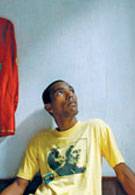In theory, East Of Havana sounds like an excellent idea for a documentary: Two filmmakers travel to Cuba in the summer of 2004 to study three up-and-coming hip-hop artists who use their music to fight for freedom under an oppressive regime. It would explore a burgeoning musical culture, provide important historical tidbits and offer an interesting look at young, impoverished kids looking to make a difference with their rhythms.
In actuality, however, East Of Havana is loaded with promise that never quite gets delivered. First-time Cuban-American documentarians Jauretsi Saizarbitoria and Emilia Menocal lack a certain focus and try to obtain too many goals, never really finding a necessary target. They start off on the right foot by introducing a trio of talented rappers—Soandry, a passionate free-thinker who misses his big brother Vladimir, a rebel who fled Cuba for the U.S. during the Mass Exodus of 1994; Magyori, a strong-willed housekeeper who spends most of her week selling clothes, trying to avoid reuniting with her siblings in prison; and Mikki Flow, a charismatic, sociable musician living with his grandpa.
But beyond these descriptions, we never really learn that much about them. They do mention that they are part of a hip-hop collective called “El Cartel,” which practices for an annual hip-hop festival—their one real opportunity to get their music out there. And, supposedly, they are a tight-knit group of friends, although they rarely have conversations or show any real bonds. In fact, none of them really has anything interesting to say; they are all far more involving when they are rapping, igniting the raw emotion of an episode of Russell Simmons’ Def Poetry Jam.
The rest of the film, co-produced by actress/activist Charlize Theron, feels equally as uneven. There are a few segues into crucial history lessons that never really get fleshed out, with the directors opting to point fingers only at Castro and Russia for the sorry state of the country without ever suggesting the U.S.’s role—surely our ongoing trade embargo isn’t doing much to help their economy either. If you’re going to really delve into reasons how this all happened, then you may as well go all the way with it.
East Of Havana finally taps into something emotional when Vladimir is interviewed in the U.S. and given recent pictures of his family. Too bad it amounts to little more than a few fleeting minutes of him looking sad and noting that his brother is “all grown up now.” It would have been great if they had a chat or, better yet, some kind of reunion (surely the documentarians could have footed the bill for a Webcam). Here’s a great opportunity for a real, human moment…and there it goes.
That’s the disappointing thing about East Of Havana—it always plays it safe. Considering the sad reality of Cuba nowadays, with the kids fighting to earn a few cents a day and never going to school, there is an important message here that is never properly articulated. It doesn’t help that Cinematographer Christophe Lanzenberg injects the shots with colorful, music-video flashiness that doesn’t fit with the tone of the film at all. A powerful hip-hop song makes you want to hop off the couch and change the world; East Of Havana, sadly, just made me want to change the channel.
Your Daily Blend of Entertainment News

